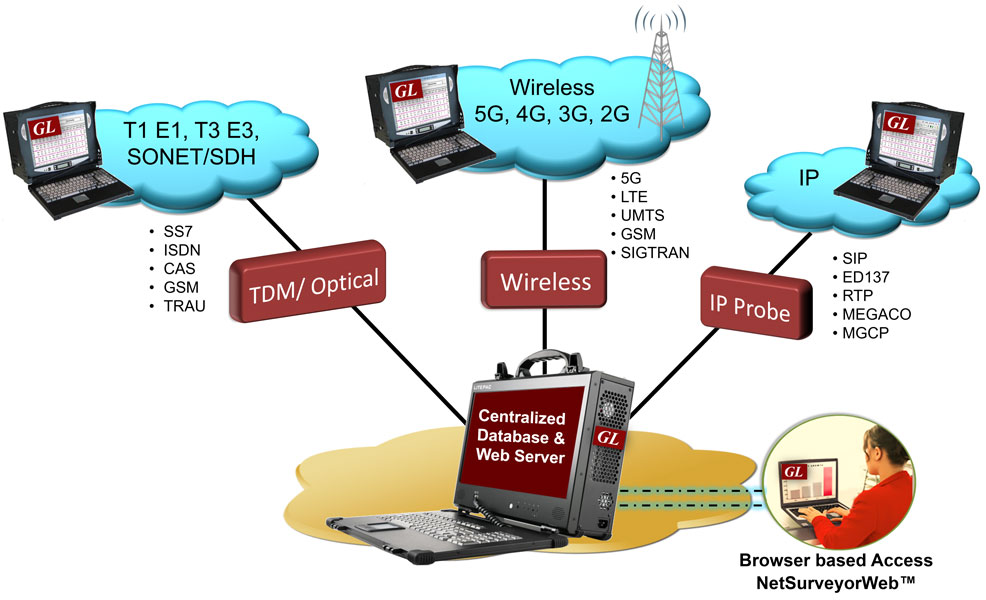GL Announces ISDN & T1 E1 Physical Layer Monitoring Software
Gaithersburg, Maryland, USA – April 18, 2016 - GL Communications Inc., announced today it's ISDN Network Surveillance & T1 E1 Physical Layer Monitoring Software.

Speaking to press, Mr. Matthew Yost, the Director of Business Development of the company, said, “GL’s Network Monitoring and Diagnostic Systems are web-based applications that facilitate display of Call Detail Records (CDRs) by connecting to TDM, Optical, or IP probes through a web server for monitoring physical layer, signaling and traffic.
GL provides a variety of solutions for network wide monitoring and surveillance. GL's Network Monitoring Solutions using NetSurveyorWeb™ for TDM networks cover the following: TDM and Optical Network Monitoring and Surveillance System (passive / non-intrusive probes) - SS7, ISDN, GSM Abis, TRAU. And Digital T1 E1 Line Monitoring, Test, and Diagnostic System.”
He added, “GL’s NetSurveyorWeb™ is based on a scalable and flexible architecture. It is used in conjunction with GL’s Protocol Analyzer probes to non-intrusively monitor from one or many testing locations. GL's protocol analysis probes feed data to a centralized database (Oracle) in real-time for further analysis. The probes provide instant visibility into the performance and operation of TDM, VoIP, and Wireless networks. The NetSurveyorWeb™ client application then locally or remotely facilitates to view records from the database using a simple web browser.”
Mr. Yost explained, “Physical Layer Monitoring is also available using the capture probes (PSTN, IP). The layer 1 alarms and statistics are sent to the centralized database along with the protocol information of the call or as a stand-alone service. GL’s NetSurveyorWeb™ provides easy viewing of the entire network or the option to drill down to a specific interface. Alarm timestamping, developing alarm trends and trigger-based actions are all features of the product.
ISDN Layer monitoring provides capturing and analyzing stream of frames on an ISDN PRI links. CDR parameters indicate status of each call i.e. active/completed, duration of completed call, called and calling party number, call reference value (CRV) etc. Summary View displays Device #, Time Slot, Frame #, LAPD information, ISDN Message types and more. Each Call is also depicted by message sequence, which gives ladder diagram of the call flow between the Called and the Calling numbers. This call flow graph allows easy verification of the status and the messages exchanged in a call. Users can highlight any messages in the ladder diagram and observe the corresponding detail decoded message details.”
He further added, “Key Performance Indicators (KPIs) and reports provide the user a graphical view of the collected data. These generally will show network summary information, but can also be used to view specific “events of interest”. GL’s NetSurveyorWeb™ provides a very flexible SQL-based query design for KPI configuration. This allows even the most complicated of scenarios to be graphed and monitored. Some of the important KPIs the user can view are: Inbound Vs Outbound Calls, Simultaneous Calls on All Trunks, Trunk-Wise Report, Call Types and Real-time Alarm Notifications and more.”
Important Applications
- Comprehensive analysis from overall network health to detailed protocol monitoring
- CDR, fraud detection and location, remote protocol analysis and troubleshooting, real-time signaling monitor, traffic optimization engineering, and statistics
- Determine actual call signaling routes to verify network functionality under all situations including congestion and loss of SS7 nodes
- Revenue and billing verification, alarm monitoring, intrusive testing
- Quality of service measurements, call trace and recording
 Back to Press Releases Index Page
Back to Press Releases Index Page